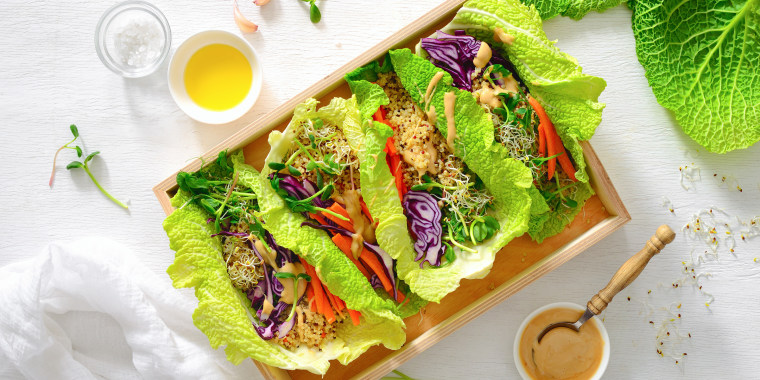Though celebs (from Kelly Ripa to Gwyneth Paltrow to Victoria Beckham) have raved about the benefits of the alkaline diet (More energy! Less pain!), dietitians and nutrition scientists say to take a step back. The evidence behind these claims is actually pretty weak.
“It’s not that the foods that the diet is promoting are particularly concerning,” explained Deirdre K. Tobias, ScD, associate epidemiologist at Brigham and Women’s Hospital and assistant professor at Harvard Medical School and Harvard T.H. Chan School of Public Health. In fact, you’ll be eating a lot of fresh fruits and vegetables on the diet, which are healthy for everyone. “Rather, it’s the mechanism and health claims where the pseudoscience is,” she said.
What do proponents of the alkaline diet say?
The thinking behind the diet is that acidic foods (like red meat, processed sugars and dairy) make the body more acidic and do harm (like boosting chronic inflammation, which is linked to chronic pain and increased risk of heart disease, bone loss and cancer). Proponents of the diet liken acidic foods (like high-sugar snacks, caffeinated drinks and processed foods) to acids that can burn metal: imagine the damage it can do to your body, they claim.
On the other hand, more alkaline (or basic) foods (like fresh fruits, vegetables and nuts) decrease acid in the body and promote health benefits, according to those who promote the diet. Neutral foods like whole grains and olive oil are allowed because supposedly they don’t do anything to the body’s alkalinity.
Is there any science to support certain foods changing the pH of your body?
An alkaline diet promotes more fruits, vegetables, nuts and legumes and discourages processed foods; these eating patterns have been linked to health benefits over and over again, Tobias said. But there’s no evidence that you’re benefiting from these foods because they’re doing anything to the body’s pH level, she said.
Your body’s pH level is actually very finely tuned. Your gastrointestinal organs are more acidic, which helps break down the proteins going through them. Pancreatic fluid and bile in the gut tend to be more basic, helping to neutralize stomach acid and aid digestion. Vaginal fluid tends to be pretty acidic, which discourages growth of harmful bacteria. The pH level of the urine fluctuates from acidic to basic, depending on what needs to be flushed out of the body to neutralize it.
Blood pH is very tightly controlled. “If it were to significantly change [it] would actually be pretty worrisome,” Tobias said.
There are claims that cancer cells thrive in acidic environments, but this knowledge comes from studies done by scientists observing cancer cells in petri dishes, not in the human body. There’s no evidence that the foods you eat change the pH of various cells and tissues in the body in ways that could either promote or discourage cancer growth.
Are there risks to following an alkaline diet?
Though the claims behind the mechanisms of the diet are widely unsubstantiated, the foods you’re eating on it are generally recognized as very healthy and part of a balanced diet, said Amy Shapiro, RDN founder and director of Real Nutrition in New York City. But because you’re cutting out so many foods (like meat, poultry, fish, dairy and – depending on which version of the diet you’re doing – maybe soy and legumes), she said: “You might be really limiting your food.” (If you are limiting food too much, malnutrition is a risk.)
Another risk is if you’re specifically following the diet instead of taking other steps to protect your health against chronic disease – or instead of treatment for an illness like cancer because of its purported benefits, Tobias said. “If it’s in lieu of necessary medical care, then that can be dangerous.”
What will you eat on an alkaline diet?
On the alkaline diet, you’ll be eating lots of fresh fruits and vegetables, nuts, seeds, whole grains and root vegetables. Think: avocados, walnuts, almonds, farro, quinoa, broccoli, celery, peppers and greens. Some alkaline diets allow you to eat legumes and soy products; others suggest avoiding them.
Acidic foods to limit on the alkaline diet include: meat and all animal products (including dairy), processed sugars, sugar-sweetened beverages, caffeine and processed foods.
What a day of eating on the alkaline diet might look like:
Here’s a sample menu for an alkaline diet from Shapiro:
- Breakfast: Power smoothie (berries, 1/2 banana, 1 cup spinach, 1/4 avocado , almond milk, 1 teaspoon coconut oil, 1 tablespoon chia seeds, cinnamon to taste)
- Lunch: Lettuce wraps (sliced avocado topped with crushed pistachios with a variety of vegetables wrapped in butter lettuce leaves)
- Snack: Sliced pear with hemp seeds and cinnamon
- Dinner: Roasted sweet potato (in coconut oil) with roasted chicken and broccoli
- Dessert: Coconut yogurt topped with pomegranate seeds
The alkaline diet is similar to:
- Anti-inflammatory diet, which also focuses on produce and whole grains and limits animal products and processed foods
- Vegan diet, which focuses on whole plant-based foods and excludes animal products
- Mediterranean diet, which focuses on whole foods and minimizes processed foods, but does allow seafood
Bottom line
There’s scant-to-no evidence that you can change the pH of your body with food or that doing so would benefit things like bone health, treat or prevent cancer or boost energy. There is evidence that foods promoted on an alkaline diet tend to be healthy ones. But some alkaline diets have you cutting out foods that have largely been found to be part of a healthy diet, like legumes, fish and coffee.
If you do decide to give the diet a try, make sure you educate yourself about the diet and take time to prep foods allowed on the eating plan so you eat enough, Shapiro said. As always, discuss any dietary changes with your doctor who can tailor an eating plan to your specific health concerns.


